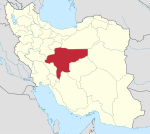| Grand Mosque of Zavareh | |
|---|---|
مسجد جامع زواره | |
 | |
| Religion | |
| Affiliation | Islam |
| Province | Isfahan Province |
| Ecclesiastical or organizational status | In use occasionally |
| Location | |
| Location | Zavareh, Isfahan, Iran |
| Architecture | |
| Type | Razi |
Jāmeh Mosque of Zavareh ( Persian: مسجد جامع زواره Masjed-e-Jāme-e Zavareh), Congregation mosque of Zavareh, Friday mosque of Zavareh or Grand mosque of Zavareh is the congregational mosque (jāmeh) of the city of Zavareh in the Isfahan Province of Iran.
Centrally located in the pre-Islamic city of Zavareh, this mosque is the earliest dated example of a four-iwan scheme. Contrary to most Seljuk mosques, the inscription containing the date and the patronage for the building is on the courtyard façade. Although this information is not completely preserved, a date of 1135 (530 AH) can be established for this building. The patron of the mosque is identified as Abu Taher Hosein bin Ghali bin Ahmad. In another inscription on the eastern side of the south iwan, the date of the mihrab is recorded as 1156 (551 AH). [1]
See also
References
| Grand Mosque of Zavareh | |
|---|---|
مسجد جامع زواره | |
 | |
| Religion | |
| Affiliation | Islam |
| Province | Isfahan Province |
| Ecclesiastical or organizational status | In use occasionally |
| Location | |
| Location | Zavareh, Isfahan, Iran |
| Architecture | |
| Type | Razi |
Jāmeh Mosque of Zavareh ( Persian: مسجد جامع زواره Masjed-e-Jāme-e Zavareh), Congregation mosque of Zavareh, Friday mosque of Zavareh or Grand mosque of Zavareh is the congregational mosque (jāmeh) of the city of Zavareh in the Isfahan Province of Iran.
Centrally located in the pre-Islamic city of Zavareh, this mosque is the earliest dated example of a four-iwan scheme. Contrary to most Seljuk mosques, the inscription containing the date and the patronage for the building is on the courtyard façade. Although this information is not completely preserved, a date of 1135 (530 AH) can be established for this building. The patron of the mosque is identified as Abu Taher Hosein bin Ghali bin Ahmad. In another inscription on the eastern side of the south iwan, the date of the mihrab is recorded as 1156 (551 AH). [1]
See also
References














